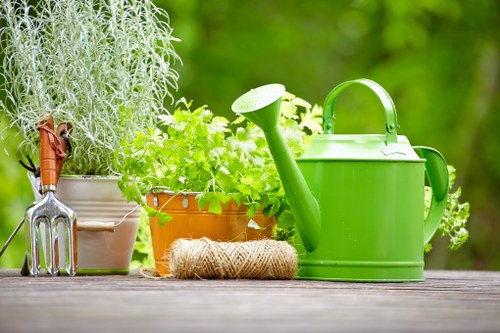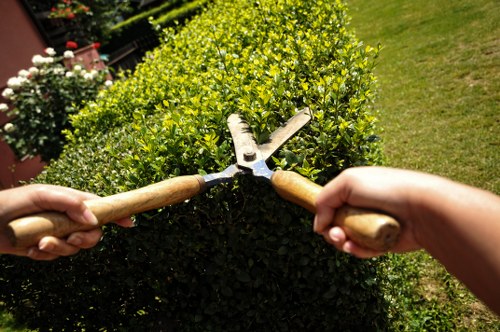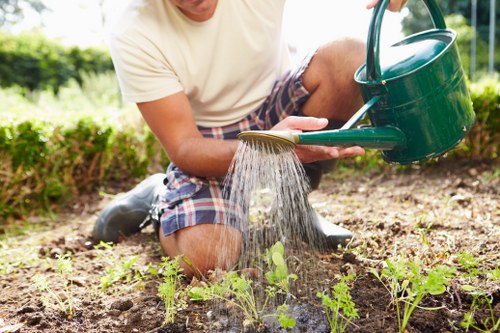Comprehensive Guide to Garden Maintenance in Canary Wharf

Maintaining a beautiful garden in Canary Wharf can be a rewarding endeavor. Whether you're a resident looking to enhance your outdoor space or a business aiming to create an inviting environment, effective garden maintenance is key. This guide explores essential tips and strategies to keep your garden thriving in the heart of Canary Wharf.
Canary Wharf's unique urban setting presents both challenges and opportunities for garden maintenance. From limited space to diverse plant species, understanding the specific needs of your garden is crucial for its success.
In this article, we'll delve into various aspects of garden maintenance, including soil health, plant selection, watering techniques, and seasonal care. By following these guidelines, you can ensure that your garden remains lush, vibrant, and a standout feature of Canary Wharf.

Understanding the Climate in Canary Wharf
Canary Wharf enjoys a temperate maritime climate, characterized by mild winters and cool summers. However, the urban environment can lead to microclimates that may affect your garden's health. It's essential to consider these factors when planning your garden maintenance.
One key aspect of the climate is rainfall distribution. While Canary Wharf receives ample rainfall throughout the year, proper drainage is vital to prevent waterlogging, which can harm plant roots and reduce soil quality.
The wind patterns in the area also play a significant role. Strong urban winds can cause damage to delicate plants and increase evaporation rates, making it necessary to choose wind-resistant species and implement protective measures.

Soil Health and Preparation
Healthy soil is the foundation of any successful garden. In Canary Wharf, urban soils can be compacted and depleted of essential nutrients, making soil preparation a critical step in garden maintenance.
Testing and Amending Soil
Begin by testing your soil to determine its pH level and nutrient content. This information will guide you in making necessary amendments, such as adding compost, manure, or specific fertilizers to enhance soil fertility.
Improving soil structure through the incorporation of organic matter not only boosts nutrient availability but also enhances drainage and aeration, promoting robust plant growth.
- Conduct a soil test to assess pH and nutrient levels.
- Incorporate organic matter like compost to improve soil structure.
- Adjust pH levels based on test results using lime or sulfur.

Plant Selection for Urban Gardens
Choosing the right plants is crucial for garden maintenance in Canary Wharf. Opt for species that thrive in urban environments and are resilient to local climate conditions.
Native and Drought-Resistant Plants
Native plants are well-adapted to the local climate and soil conditions, making them easier to care for and more resistant to pests and diseases. Drought-resistant varieties are particularly beneficial in reducing water usage and ensuring plant survival during dry spells.
Popular choices include evergreen shrubs, ornamental grasses, and perennial flowers that add both beauty and functionality to your garden.
- Select native plant species suited to Canary Wharf's climate.
- Incorporate drought-resistant plants to minimize water consumption.
- Mix flowering plants with foliage plants for year-round interest.

Efficient Watering Techniques
Proper watering is vital for maintaining a healthy garden, especially in an urban setting like Canary Wharf. Implementing efficient watering techniques can conserve water and ensure that your plants receive adequate moisture.
Drip Irrigation and Rainwater Harvesting
Drip irrigation systems deliver water directly to the plant roots, minimizing evaporation and runoff. This method is highly effective for urban gardens where water conservation is a priority.
Rainwater harvesting involves collecting and storing rainwater for later use in watering your garden. This sustainable practice reduces dependence on municipal water supplies and promotes eco-friendly gardening.
- Install a drip irrigation system for precise watering.
- Set up rain barrels to collect and store rainwater.
- Use mulch to retain soil moisture and reduce the need for frequent watering.

Pest and Disease Management
Urban gardens are susceptible to various pests and diseases that can compromise plant health. Effective pest and disease management strategies are essential for maintaining a thriving garden in Canary Wharf.
Integrated Pest Management (IPM)
IPM involves a combination of biological, cultural, and chemical methods to control pests in an environmentally responsible way. This approach minimizes the use of harmful pesticides and promotes natural pest predators.
Regular monitoring of your garden allows for early detection of pest issues, enabling timely interventions before problems escalate.
- Introduce beneficial insects like ladybugs and lacewings to control pest populations.
- Practice crop rotation and proper spacing to reduce disease incidence.
- Use organic pesticides as a last resort to manage infestations.

Seasonal Garden Care
Each season brings its own set of challenges and opportunities for garden maintenance. Adapting your care routine to seasonal changes ensures your garden remains healthy and vibrant year-round.
Spring: Renewal and Growth
Spring is a time for planting and preparing your garden for the growing season. Focus on pruning dead branches, fertilizing the soil, and planting new perennials and annuals.
Regular weeding and mulching during spring help establish a strong foundation for plant growth.
- Prune shrubs and trees to remove dead or damaged wood.
- Plant spring-flowering bulbs for early color.
- Apply mulch to conserve soil moisture and suppress weeds.

Summer: Sustaining Growth
During the summer months, maintaining adequate moisture levels is critical for plant health. Regular watering and monitoring for pests are essential tasks.
Heat Management
Extreme heat can stress plants, leading to wilting and reduced growth. Implement shading techniques and avoid watering during the hottest parts of the day to prevent water loss through evaporation.
Additionally, harvesting produce regularly can encourage continued growth and productivity.
- Water plants in the early morning or late evening to reduce evaporation.
- Provide shade to sensitive plants using shade cloths or strategic plant placement.
- Regularly harvest vegetables and fruits to promote further production.

Autumn: Preparing for Winter
Autumn is the ideal time to prepare your garden for the colder months ahead. Focus on clearing debris, planting fall vegetables, and protecting sensitive plants from frost.
Soil Preparation
Incorporate fallen leaves and other organic matter into the soil to enrich it for the next growing season. This practice improves soil structure and fertility, laying the groundwork for future plantings.
Covering plants with mulch or protective fabrics can safeguard them against frost and harsh winter conditions.
- Remove spent plants and clear garden beds of debris.
- Plant cover crops to enhance soil health.
- Apply mulch to insulate plant roots from freezing temperatures.

Winter: Minimal Maintenance
While winter is a quieter season for garden maintenance, there are still important tasks to ensure your garden remains in good condition.
Protecting Perennials and Structures
Protect perennial plants by cutting back dead stems and applying mulch to insulate them. Inspect garden structures such as fences and trellises for any damage caused by winter weather and perform necessary repairs.
Planning for the upcoming year by ordering seeds and preparing garden layouts can give you a head start when spring arrives.
- Prune perennials to remove dead or diseased material.
- Inspect and repair garden structures to ensure stability.
- Plan and design your garden layout for the next growing season.

Tools and Equipment for Effective Maintenance
Having the right tools and equipment is essential for efficient garden maintenance in Canary Wharf. Quality tools not only make tasks easier but also contribute to the overall health and appearance of your garden.
Essential Gardening Tools
Invest in a set of reliable tools such as pruners, trowels, spades, and hoes. These basics will help you perform various maintenance tasks with ease.
Additionally, specialized equipment like irrigation systems, lawn mowers, and garden tractors can enhance productivity, especially for larger gardens or commercial spaces.
- Pruners and shears for trimming and shaping plants.
- Spades and trowels for soil preparation and planting.
- Irrigation systems to automate and optimize watering.

Professional Garden Maintenance Services
For those who prefer to leave garden maintenance to the experts, numerous professional services are available in Canary Wharf. These services offer comprehensive care tailored to your garden's specific needs.
Benefits of Hiring Professionals
Professional gardeners bring expertise, experience, and equipment that can significantly enhance the appearance and health of your garden. They handle tasks such as landscape design, regular upkeep, and troubleshooting plant issues.
Engaging a professional service ensures that your garden receives consistent and high-quality maintenance, allowing you to enjoy a beautiful outdoor space without the hassle.
- Customized garden design and planning.
- Regular maintenance services, including pruning, weeding, and fertilizing.
- Expert advice on plant selection and garden improvements.

Sustainable Gardening Practices
Adopting sustainable gardening practices not only benefits your garden but also contributes positively to the environment in Canary Wharf.
Organic Gardening
Organic gardening avoids the use of synthetic chemicals, relying instead on natural methods to enhance soil fertility and control pests. This approach promotes biodiversity and creates a healthier ecosystem.
Techniques such as composting, crop rotation, and the use of natural fertilizers can significantly improve your garden's sustainability.
- Utilize compost to enrich soil organically.
- Implement crop rotation to prevent soil depletion and reduce pest buildup.
- Use natural pest deterrents to maintain plant health without harmful chemicals.

Maximizing Small Spaces
In Canary Wharf, space can be limited, especially in urban gardens and balconies. Maximizing small spaces requires thoughtful planning and creative solutions to ensure a lush and functional garden.
Vertical Gardening
Vertical gardening utilizes walls, trellises, and other vertical structures to grow plants upward, saving valuable ground space. This method is ideal for growing herbs, flowers, and even vegetables in compact areas.
Container gardening is another effective strategy, allowing you to grow a variety of plants in pots, planters, and raised beds tailored to your available space.
- Install trellises or wall-mounted planters for vertical growth.
- Choose compact and multi-functional plant varieties.
- Use hanging baskets and vertical planters to add greenery without taking up floor space.

Lighting and Aesthetics
Proper lighting can enhance the beauty and functionality of your garden in Canary Wharf, making it a pleasant space even after dark.
Outdoor Lighting Solutions
Incorporate a mix of ambient, task, and accent lighting to highlight key features of your garden. Solar-powered lights are an eco-friendly option that reduces energy consumption while providing adequate illumination.
Strategically placed lights not only improve safety but also create a warm and inviting atmosphere, perfect for evening gatherings and relaxation.
- Use string lights to add a festive touch to outdoor areas.
- Install path lights to guide visitors and enhance safety.
- Highlight plants and garden structures with spotlights and accent lighting.

Creating a Low-Maintenance Garden
For those with busy lifestyles, a low-maintenance garden in Canary Wharf can provide beauty without requiring constant attention. This approach involves selecting hardy plants and implementing efficient maintenance practices.
Choosing Low-Maintenance Plants
Opt for plants that are drought-tolerant, pest-resistant, and require minimal pruning. Succulents, ornamental grasses, and native shrubs are excellent choices for easy-care gardens.
Additionally, using ground covers and mulches can reduce the need for frequent weeding and watering.
- Select plants known for their resilience and minimal care requirements.
- Incorporate ground covers to suppress weeds and retain soil moisture.
- Automate watering systems to ensure consistent moisture levels with minimal effort.

Enhancing Garden Biodiversity
Promoting biodiversity in your garden can lead to a healthier ecosystem, attracting beneficial insects and wildlife while deterring pests naturally.
Plant Diversity and Wildlife Habitats
Incorporate a diverse range of plant species to create habitats for various pollinators, birds, and beneficial insects. This diversity enhances resilience against pests and diseases, fostering a balanced garden environment.
Creating microhabitats, such as birdhouses, insect hotels, and water features, can further support wildlife diversity and contribute to the overall health of your garden.
- Plant a variety of species to attract different pollinators and beneficial insects.
- Create habitats with features like birdhouses and water sources.
- Avoid monocultures to reduce vulnerability to pests and diseases.

Budget-Friendly Maintenance Tips
Maintaining a beautiful garden doesn't have to break the bank. Implementing budget-friendly strategies can help you manage costs while keeping your garden in top shape.
DIY Projects and Cost-Effective Solutions
Engage in DIY gardening projects, such as building raised beds or creating compost bins, to save on professional service costs. Reusing materials and repurposing containers are also effective ways to manage expenses.
Additionally, prioritizing essential maintenance tasks and planning seasonal activities can prevent costly repairs and plant replacements in the long run.
- Build your own compost bin to recycle garden waste.
- Create raised beds using reclaimed wood or materials.
- Plan and prioritize maintenance tasks to manage resources effectively.

Community Gardening in Canary Wharf
Community gardens offer a unique opportunity to engage with neighbors and enhance the green spaces in Canary Wharf. Participating in a community garden can provide access to shared resources and collective maintenance efforts.
Benefits of Community Gardening
These collaborative spaces promote social interaction, environmental stewardship, and communal well-being. They also offer educational opportunities for individuals to learn about sustainable gardening practices and plant care.
Joining a community garden can ease the burden of maintenance as responsibilities are shared among members, fostering a sense of community and shared purpose.
- Connect with neighbors and build a sense of community.
- Share resources and tools to reduce individual costs.
- Learn from experienced gardeners and gain new skills.

Conclusion
Effective garden maintenance in Canary Wharf requires a blend of knowledge, planning, and dedication. By understanding the local climate, selecting appropriate plants, and implementing sustainable practices, you can create and maintain a stunning garden that thrives in an urban environment.
Whether you choose to manage your garden independently or enlist professional services, the key is to stay informed and adaptable to ensure your garden remains a beautiful and vibrant space year-round.
Embrace the challenges and rewards of garden maintenance in Canary Wharf, and transform your outdoor area into a serene and inviting oasis amidst the bustling cityscape.
Ready to transform your garden? Contact us today to book your garden maintenance service and bring your outdoor vision to life!
